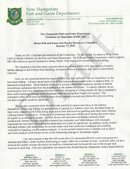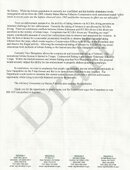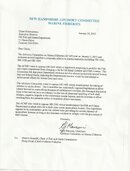Lobster Bill update:
Today was the hearing. For the 9 divers that showed up in support of the bill, thank you for taking time off from work to attend. We had Aquatic Escapes dive shop in Londonderry in attendance. Thank you.
Everyone that wanted to speak was given the opportunity to testify.
Those that testified against the bill included:
3 Commercial lobsterman
Former State rep and Fish and Game Committee Chair Robert L’Heureaux (Merrimack)
Doug Grout, Chief of Marine Fisheries.
NH Fish & Game Officer
We still have a chance. Chairman Clifford Newton indicated Rep. David Watters, Rep. Joe Duarte and Rep. Lyle Bulis will be on sub-committee.
ACTION: Please write, call the above to show your support.
BE POLITE and MAKE SURE YOU PUT YOUR NAME TELEPHONE NUMBER AND TOWN YOU ARE FROM ON EVERY EMAIL. Can't stress that enough.
Calls to them are best. Hand written letters are second. Emails are third. Blanket emails are last. But whatever you can do.......
Also Testimony from Doug Grout, Chief of Marine Fisheries and a letter from Geno Marconi, Chairman of Advisory Committee on Marine Fisheries to Glenn Normandeu, Exec Director of NH F&G
Address the concerns in their testimony when you write to sub-committee members.
Below is my attempt to address each of the four major concerns of Doug Grout about the effects of HB-1455. I relayed these to Greg Hill to submit to the Chariman.
1) First concern is on negative effect method of harvest would have on near shore habitat
Doug points out how divers would turnover numerous rocks on every dive to get at the lobsters under, thereby damaging sea life.
Divers do not use this method as it is ineffective. The moment you lift the rock, the lobster bolts. You can’t possibly catch up to the lobster and the lobster will get under another rock before you can catch up to it.
How is this less damaging to environment than a lobsterman dragging his traps on the bottom over rocks, eelgrass beds when they are hauling their pots??
2) 2nd concern is method of capture. Fishing is passive capture vs. SCUBA which is active form.
Divers don’t bother going after undersized lobsters. You can easily tell that they are “short” and not worth the hassle of going after so we leave them untouched.
When we do see a lobster is short or is egg bearing, or has a “V-notch”, the diver will put the lobster back where they grabbed it from and the lobster will go back in.
The diver will also mark a “v-notch” with their knife to identify the lobster as egg-bearing before releasing.
Doug says Scuba divers will handle numerous short (undersized lobsters) in searching for legal side.
Commercial lobsterman in their “passive” method also handle lobsters (shorts, egg bearing) and they drop them over board to fall 30-40 feet down, often, not near the spot it was pulled from and the lobster is vulnerable to predators while it finds a safe place.
Also, Doug points out the concern of newly molted “soft shelled” lobsters. When divers encounter soft shelled lobsters, they do not bring them up because of their soft shells can’t really be pulled out without killing them. Once a lobster dies, the meat goes bad quickly. For this reason, divers DO NOT take them. Also, they are not as meaty. The reason they molt is to make room to grow in their bodies. So there is not as much meat in a molted lobster one that is same size and hasn’t molted.
3) Concern bill would allow for increased taking of lobster when trying to reduce.
Gary addressed that this bill will REDUCE the taking of lobsters.
Also, if EVERY Certified diver in the state dove every day in the month of Sept and took maximum allowable limit under this proposed bill (5), the amount of impact would be less than .01% catch of commercial lobsterman.
This exact argument was used in the hearings by divers when the Mass Commercial Lobsterman tried to appeal the current allowing of diving for lobsters. (and the appeal was denied)
One requirement of the lobster license is to report the no. of lobsters caught by divers. (Also a requirement in Mass)
We’ll have data to show the impact on the total catch.
4) Concerns of enforcement for policing.
Currently, divers can legally Scuba dive for Scallops (during season), Oysters and spear fish. There are no issues enforcing this.
Doug points out that conservations officers would have to be diving in the immediate area to observe and police diving for lobsters. In Massachusetts, Environmental Police DO NOT have to resort to this and police the same methods they use for fisherman. Randomly checking boats and divers as exiting to measure lobsters caught, check for illegal sized, egg bearing.. and also asking to show permits.
Lastly, Doug points out that people can harvest lobsters recreationally in VIA the 5 trap license. This is true BUT doing so REQUIRES A BOAT which not every citizen can afford such a luxury.
Below are all Committee Members: (contact info
House of Representatives)
Chairman: Clifford Newton(r) -
168 Old Dover Rd
Rochester, NH 03867-4548
Home
Phone:
(603)332-5643
271-3125
V. Chairman: Dennis Reed(r)
Clerk: Joe Duarte
Betsy McKinney (r)
Lyle Bulis (r)
Elisabeth Sanders (r)
Michael McCarthy (r)
Leo Pepino (r)
Richard Okerman (r)
Tyler Simpson (r)
Norman Tregenza (r)
Marc Tremblay (r)
James Webb (r)
Daniel Carr (d)
David Watters (d)
Benjamin Lefebvre (d)
Dick Patten (d)
Jenna Roberts (d)
Other Things to include in your notes/calls.
We are good honest people who aren't out to eliminate the lobsterman's way of life and equipment?
We think this is a reasonable attempt to minimally affect the industry and still SHARE in the state's natural resources.
We are open to suggestions (other than KILL THIS BILL) about how to change the bill to make it possible to prove the above.
We believe that this is working in EVERY east coast state but Maine and we can't understand why it wouldn’t be possible here.
We have very small requirements in this bill compared to our neighbor Massachusetts (5 per day vs. 15 in mass, one month vs. 6 months in Mass,) and none of the lobsterman in MA complain about the scuba divers. They complain about the fertilizer killing the lobsters 10 X as much.
Stuff like that. Keep it short sweet and informative. Give them the answers to the questions they SHOULD be asking. Give them the reasons WHY they should pass the bill.

--


 --
-- 

